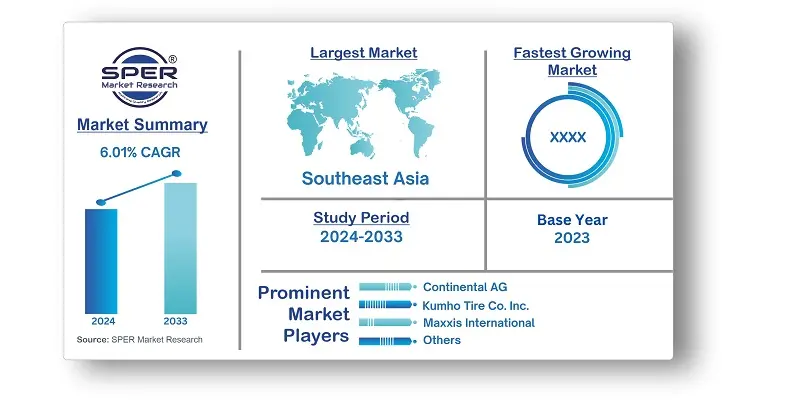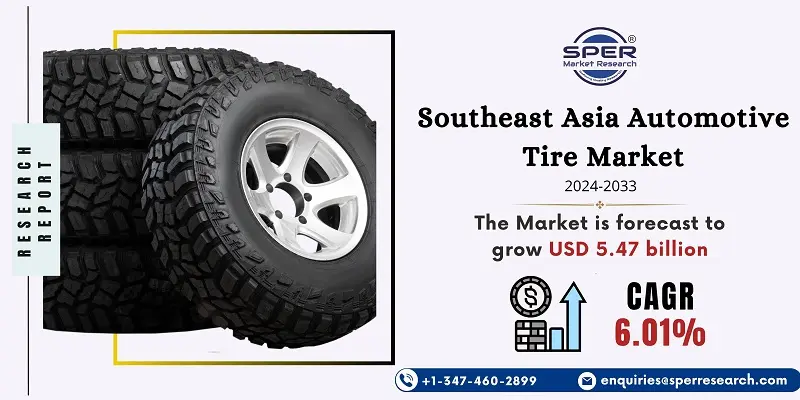
Southeast Asia Automotive Tire Market Growth, Size, Trends, Share, Revenue and Future Outlook
Southeast Asia Automotive Tire Market Size- By Type, By Vehicle Type, By End User- Regional Outlook, Competitive Strategies and Segment Forecast to 2033
| Published: Jul-2024 | Report ID: AMIN24177 | Pages: 1 - 156 | Formats*: |
| Category : Automotive & Transportation | |||
- February 2024; With an emphasis on cutting-edge tire technology and environmentally friendly materials, Bridgestone established a new research and development facility in Indonesia. Bridgestone will be better equipped to create next-generation tires that are tailored to the unique requirements of the Southeast Asian market thanks to this plant.
- June 2023; In an effort to streamline the supply chain and shorten delivery times for customers across Southeast Asia, Pirelli has announced the construction of a new tire distribution center in Malaysia.


| Report Metric | Details |
| Market size available for years | 2020-2033 |
| Base year considered | 2023 |
| Forecast period | 2024-2033 |
| Segments covered | By Type, By Vehicle Type, By End-User. |
| Regions covered | Brunei, Cambodia, Indonesia, Laos, Malaysia, Myanmar, Philippines, Thailand, Rest of Southeast Asia. |
| Companies Covered | Bridgestone Sales (Thailand) Co. Ltd., Continental AG, Hankook Tire & Technology Co. Ltd., Kumho Tire Co. Inc., Maxxis International, Michelin, Pirelli & C. S.p.A., The Goodyear Tire & Rubber Company, The Yokohama Rubber Co. Ltd., Toyo Tire Corporation, Others. |
- Automotive Dealerships
- Tire Retailers
- Commercial Fleet Operators
- Government Transportation Agencies
- OEMs
| By Type: |
|
| By Vehicle Type: |
|
| By End-Use: |
|
- Southeast Asia Automotive Tire Market Size (FY’2024-FY’2033)
- Overview of Southeast Asia Automotive Tire Market
- Segmentation of Southeast Asia Automotive Tire Market by Type (Radial, Bias)
- Segmentation of Southeast Asia Automotive Tire Market by Vehicle Type (Passenger Cars, Light Commercial Vehicles, Medium and Heavy Commercial Vehicles, Two Wheelers, Off-The-Road)
- Segmentation of Southeast Asia Automotive Tire Market by End-Use (OEM, Aftermarket)
- Statistical Snap of Southeast Asia Automotive Tire Market
- Expansion Analysis of Southeast Asia Automotive Tire Market
- Problems and Obstacles in Southeast Asia Automotive Tire Market
- Competitive Landscape in the Southeast Asia Automotive Tire Market
- Impact of COVID-19 and Demonetization on Southeast Asia Automotive Tire Market
- Details on Current Investment in Southeast Asia Automotive Tire Market
- Competitive Analysis of Southeast Asia Automotive Tire Market
- Prominent Players in the Southeast Asia Automotive Tire Market
- SWOT Analysis of Southeast Asia Automotive Tire Market
- Southeast Asia Automotive Tire Market Future Outlook and Projections (FY’2024-FY’2033)
- Recommendations from Analyst
1.1. Scope of the report1.2. Market segment analysis
2.1. Research data source
2.1.1. Secondary Data2.1.2. Primary Data2.1.3. SPER’s internal database2.1.4. Premium insight from KOL’s
2.2. Market size estimation
2.2.1. Top-down and Bottom-up approach
2.3. Data triangulation
4.1. Driver, Restraint, Opportunity and Challenges analysis
4.1.1. Drivers4.1.2. Restraints4.1.3. Opportunities4.1.4. Challenges
4.2. COVID-19 Impacts of the Southeast Asia Automotive Tire Market.
5.1. SWOT Analysis
5.1.1. Strengths5.1.2. Weaknesses5.1.3. Opportunities5.1.4. Threats
5.2. PESTEL Analysis
5.2.1. Political Landscape5.2.2. Economic Landscape5.2.3. Social Landscape5.2.4. Technological Landscape5.2.5. Environmental Landscape5.2.6. Legal Landscape
5.3. PORTER’s Five Forces
5.3.1. Bargaining power of suppliers5.3.2. Bargaining power of buyers5.3.3. Threat of Substitute5.3.4. Threat of new entrant5.3.5. Competitive rivalry
5.4. Heat Map Analysis
6.1. Southeast Asia Automotive Tire Market Manufacturing Base Distribution, Sales Area, Product Type6.2. Mergers & Acquisitions, Partnerships, Product Launch, and Collaboration in Southeast Asia Automotive Tire Market
7.1. Southeast Asia Automotive Tire Market Size, Share and Forecast, By Type, 2020-20267.2. Southeast Asia Automotive Tire Market Size, Share and Forecast, By Type, 2027-20337.3. Radial7.4. Bias
8.1. Southeast Asia Automotive Tire Market Size, Share and Forecast, By Vehicle Type, 2020-20268.2. Southeast Asia Automotive Tire Market Size, Share and Forecast, By Vehicle Type, 2027-20338.3. Passenger Cars8.4. Light Commercial Vehicles8.5. Medium and Heavy Commercial Vehicles8.6. Two Wheelers8.7. Off-The-Road
9.1. Southeast Asia Automotive Tire Market Size, Share and Forecast, By End-Use, 2020-20269.2. Southeast Asia Automotive Tire Market Size, Share and Forecast, By End-Use, 2027-20339.3. OEM9.4. Aftermarket
10.1. Southeast Asia Automotive Tire Market Size and Market Share
11.1. Southeast Asia Automotive Tire Market Size and Market Share By Region (2020-2026)11.2. Southeast Asia Automotive Tire Market Size and Market Share By Region (2027-2033)11.3. Brunei11.4. Cambodia11.5. Indonesia11.6. Laos11.7. Malaysia11.8. Myanmar11.9. Philippines11.10. Thailand11.11. Rest of Southeast Asia
12.1. BRIDGESTONE SALES CO. LTD.
12.1.1. Company details12.1.2. Financial outlook12.1.3. Product summary12.1.4. Recent developments
12.2. CONTINENTAL AG
12.2.1. Company details12.2.2. Financial outlook12.2.3. Product summary12.2.4. Recent developments
12.3. HANKOOK TIRE & TECHNOLOGY CO., LTD.
12.3.1. Company details12.3.2. Financial outlook12.3.3. Product summary12.3.4. Recent developments
12.4. KUMHO TIRE CO., INC.
12.4.1. Company details12.4.2. Financial outlook12.4.3. Product summary12.4.4. Recent developments
12.5. MAXXIS INTERNATIONAL
12.5.1. Company details12.5.2. Financial outlook12.5.3. Product summary12.5.4. Recent developments
12.6. PIRELLI & C. S.P.A
12.6.1. Company details12.6.2. Financial outlook12.6.3. Product summary12.6.4. Recent developments
12.7. THE GOODYEAR TIRE & RUBBER COMPANY
12.7.1. Company details12.7.2. Financial outlook12.7.3. Product summary12.7.4. Recent developments
12.8. THE YOKOHAMA RUBBER CO. LTD.
12.8.1. Company details12.8.2. Financial outlook12.8.3. Product summary12.8.4. Recent developments
12.9. TOYO TIRE CORPORATION
12.9.1. Company details12.9.2. Financial outlook12.9.3. Product summary12.9.4. Recent developments
12.10. Others
SPER Market Research’s methodology uses great emphasis on primary research to ensure that the market intelligence insights are up to date, reliable and accurate. Primary interviews are done with players involved in each phase of a supply chain to analyze the market forecasting. The secondary research method is used to help you fully understand how the future markets and the spending patterns look likes.
The report is based on in-depth qualitative and quantitative analysis of the Product Market. The quantitative analysis involves the application of various projection and sampling techniques. The qualitative analysis involves primary interviews, surveys, and vendor briefings. The data gathered as a result of these processes are validated through experts opinion. Our research methodology entails an ideal mixture of primary and secondary initiatives.



Frequently Asked Questions About This Report
PLACE AN ORDER
Year End Discount
Sample Report
Pre-Purchase Inquiry
NEED CUSTOMIZATION?
Request CustomizationCALL OR EMAIL US
100% Secure Payment






Related Reports
Our Global Clients
Our data-driven insights have influenced the strategy of 200+ reputed companies across the globe.




















